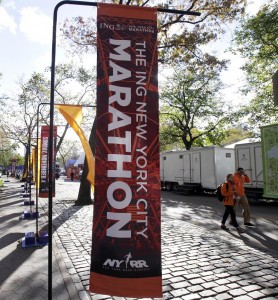
With people in storm-ravaged areas still shivering without electricity and the death toll in New York City at more than 40, many residents recoiled at the prospect of police officers being assigned to protect Sunday’s race.
An estimated 40,000 runners from around the world had been expected to take part in the 26.2-mile (42.2-kilometer) event. The race had been scheduled to start in Staten Island, one of the hardest-hit areas by this week’s storm.
A few hours after Bloomberg insisted the race would be held, he reversed his decision when top city officials lined up against him.
“We would not want a cloud to hang over the race or its participants, and so we have decided to cancel it,” the mayor said in a statement. “We cannot allow a controversy over an athletic event — even one as meaningful as this — to distract attention away from all the critically important work that is being done to recover from the storm and get our city back on track.”
The nationally televised race that winds through the city’s five boroughs and ends in Central Park has been held annually since 1970 — it was held in 2001, about two months after the Sept. 11 terrorist attacks.
The cancellation means there won’t be another NYC Marathon until next year.
Bloomberg called the marathon an “integral part of New York City’s life for 40 years” and “an event tens of thousands of New Yorkers participate in and millions more watch.”
He still insisted that holding the race would not require diverting resources from the recovery effort, but understood the level of friction.
“It is clear it that it has become the source of controversy and division,” Bloomberg said. “The marathon has always brought our city together and inspired us with stories of courage and determination.”
Mary Wittenberg, president of the organizing New York Road Runners, said it was the right move.
“It’s clear today the best thing for New York and the best thing for the marathon for the future is unfortunately to move on, and this isn’t the year or the time to run it,” she said in a statement.
“It’s crushing and it’s really difficult. It’s one of the toughest decisions we ever made, but we really believe it’s the right thing for New York,” she said.


